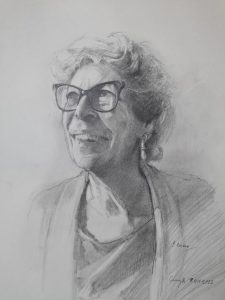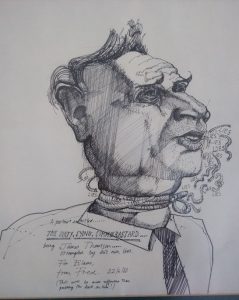Elaine Murray was a remarkable woman. Being an active trade unionist and political campaigners were just two aspects of her full and rounded life. Many people – family, partners, friends, sisters, brothers and and comrades – attended her commemoration meeting. This was held on Thursday, December 1st in the Kings Manor Hotel in Edinburgh. This commemoration was addressed by her daughter, Charisse McGowan; partner, Alan McIntyre (Argyll shepherd); Janice Donaldson (friend and colleague at Clovenstone Primary School, former member of Lothian Rank & File Teachers – LR&FT and Scottish Federation of Socialist Teachers – SFST); Lorna Stewart (friend, former teacher at Clovenstone Primary and later headteacher at Craigroyston Primary); Myra Galletly (friend and former member of LR&FT and SFST); and one time partner Norrie Bissell (writer, former member of the SFST and EIS Area Officer). Geraldine Gould (friend, writer, folksinger and former member of LR&FT and SFST) acted as the celebrant.
The following tribute in three parts consists of the portrait made by artist, Fred Crayk, which perfectly captures Elaine’s spirit; the contribution made by Myra Galletly; and the poem read out by Norrie Bissell.

6th October 1951 – 11th November, 2022
ELAINE – REMEMBERING A LIFE OF RANK AND FILE TRADE UNION ACTIVISM AND COMMITMENT TO EDUCATION
This is very much a communal effort, and I’m speaking on behalf of Elaine’s comrades and friends in teacher politics.
Elaine first became involved at Moray House when students discovered there would be virtually no jobs for the 100s of students in training that year – and occupied the college. She joined the action, visiting other colleges and helping spread the action across the country. It was then that she met some of the left-wingers who would become long-term friends and comrades. She confessed later to feeling intimidated in those early years by their political knowledge – but the reality was that right from the start she had the ability to counter leftie hackishness with her characteristic no-nonsense logic.
Elaine did get a job, in Clovenstone, and soon became the rep, recruiting almost everyone to the EIS and persuading the teachers there, with the strength of her arguments, to take unofficial and then official action, and in the early days to picket WHEC, the local secondary school in Wester Hailes. Clovenstone became one of the best organised schools in Edinburgh, and Elaine remained an active rep – unafraid to challenge management and defend members – until she left.
When she started teaching, Elaine quickly became central to the Rank-and-File teachers’ group, The Scottish Federation of Socialist Teachers, and was later a stalwart in a very right-wing Local Association in Argyll. In Edinburgh, she attended meetings regularly – no hard task, as they were often held in the smoke-filled back rooms of pubs (!) – wrote articles and helped organise campaigns. She was also active and widely respected on the Local Executive, Council and the AGM, pushing for action on a range of issues – single salary scale, class sizes, national testing and the poll tax to name a few.

Elaine was an incredibly powerful speaker, particularly at AGMs. She didn’t miss the mark in challenging the right. When she opposed inequality and injustice, she had lived the life, and spoke with an honesty that came from the heart. So, when Jim Thomson, a closet ex-communist called her a liar in front of the AGM, she was visibly distressed – but thrilled when Fred Crayk gave her a drawing of Thomson, snakes coming out of his mouth entitled “The Dirty Rotten Lying Commie Bastard”.
AGM speeches didn’t come easy to her. She would be outside the hall, smoking, hands shaking before speaking, but she spoke with conviction, passion, and often humour. I remember her calling for wider action – probably all out action – referring to the “martyrs” at the opposite mic who were in schools targeted for limited action and were claiming they were making sacrifices, missing school day after day on full pay while the rest of us paid for it. She threw her arms out and said, “Tie me to that cross!”
All of this was underpinned by a love of learning, an appreciation of the value of education, and a powerful sense of the importance of grass roots action. No one could put it better than Elaine herself, so I’ll finish by reading from a talk she gave to women trade unionists at Edinburgh City Chambers in 1996. I asked for a copy of it and have kept it ever since.
She started the talk with an exploration of grammar, which illustrates her curiosity and enthusiasm for learning:
“Grammary means magic and comes from the word grammar. So to have skill in grammar is to have skill in magic. In other words, it was seen as a source of mysterious power. And that was the case when only the elite had this skill in grammar. When everyone has this skill it loses its power or rather it empowers everyone. No wonder people were burned at the stake for printing their own versions of the bible. Education is power; literacy is knowledge; skill in grammar is magic!
She went on to education. State education has always had too strong an element of control in it. Why should we be teaching life skills? Why should we be giving young people “strategies” to cope with their difficult and often desperate lives? We shouldn’t be teaching them to come to terms with desperate prospects – we should be empowering them so that they can set about changing things.
I want to teach children to read critically, analytically, anything that comes their way, be it a Shakespeare play, a Maya Angelou novel or a Labour Party manifesto. There is a vast body of knowledge out there covering thousands of years and every corner of the globe. I want children to know who they are, where they are, and what forces shape their lives. I want to teach children to talk, argue, discuss, debate.”
Then finally, after giving an account of various teacher actions she had been involved in, Elaine raised the rhetorical question – why had she not aimed for the upper ranks of teaching, the union, or politics? And here’s her answer:
“Because that’s not where the struggle lies. I don’t know anyone who has gone along any of those paths who has not had to compromise, and compromise is the deadliest path of all. Look at the Labour Party just now in its grubby scramble for power, Its policies – all anti-working class in effect.”
But rank and file activity does make a difference. We have had an effect. That is why I would argue that grass roots activity, in whatever sphere it is seen to be necessary, is the most important work of women who want to be involved in the struggle. Build from the bottom up and refuse to compromise.”
That’s what Elaine spent her life doing – and you only have to look around at how many of us have come here from near and far to see Elaine did have a major effect. She made a huge difference.
Myra Galletly, 30.11.22
___________
To A Wild-Flowering Woman*
There goes one o’ the poor wee Murrays
nae mair poor nor wee
but strong and straight
as her loping stride up cobbled streets.
A voice and mind sharp and clear
as a spring morning on Berneray
tracing out the land with the same bright eye
of an old man in Assynt.
She gave her wean all the love she’d missed
in lonely rooms those small hands twisting papers
to set in cold black grates
no fires burn like hers.
She lives in a place
where others cannot reach
and only truth can grow
where else is there to be?
A wild-flowering woman
who welcomes foxes into her garden
and likes nothing better than to sit here
with green-growing life in bloom like her own.
Norman Bissell
- Elaine used to holiday on Berneray in the Outer Hebrides when she was young and when Berneray was still an island. Norman MacCaig, with his strong Assynt associations, was one of Elaine’s favourite poets. She joined him at home in Edinburgh in one his famed Leamington Terrace sessions after he had given a public poetry reading.
____________
also see:
Our Forth Scotland with love to Standing Rock, South Dakota
Brian Higgins: a personal and political tribute- Allan Armstrong, RCN
and Elaine’s comment
